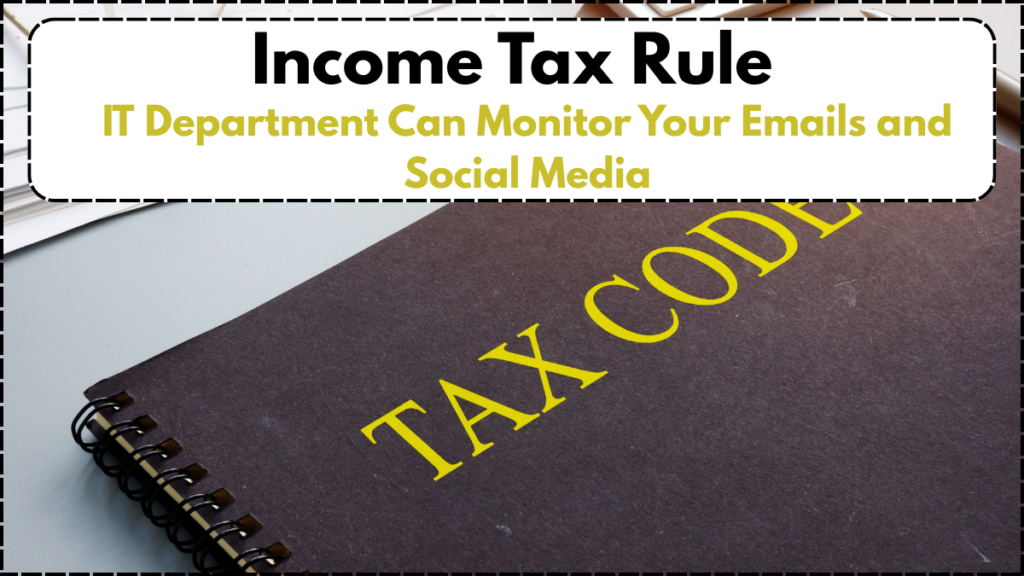Starting April 1, 2025, the Income Tax Department in India will have expanded legal authority to access individuals’ digital domains. This includes personal email accounts, social media platforms, online banking, digital investment portfolios, trading accounts, and cloud storage. The move is part of a broader update to tax governance, aimed at curbing tax evasion in an increasingly digital economy.
The new provisions empower officials to penetrate digital systems in the same way they could previously inspect physical spaces. This change reflects the evolving nature of income and asset management in 2025, where virtual platforms hold significant financial and personal data.

Expanded Tax-Free Limit with Stricter Oversight
The government has introduced a new tax relief—annual income up to ₹12 lakh is now tax-exempt. This is intended to ease the financial burden on middle-class taxpayers. However, this benefit comes alongside tighter scrutiny of digital footprints.
The Income Tax Department has reassured law-abiding citizens that this shift targets only those suspected of concealing income or assets. For honest taxpayers, there is no cause for concern.
Legal Basis for Digital Access: Updated Provisions Explained
The authority for this access is grounded in the revised framework of the Income Tax Act, particularly in provisions that build upon the existing Section 132 of the IT Act, 1961.
Section 132 – Then and Now
| Aspect | Old IT Act (1961) | New Income Tax Rules (2025) |
|---|---|---|
| Access Scope | Physical property, documents, accounts | Includes virtual and digital assets |
| Authorized Action | Breaking physical locks | Override digital access codes |
| Reason for Search | Suspicion of tax evasion | Same, with inclusion of virtual platforms |
| Search Objects | Lockers, safes, property | Emails, social media, cloud storage, devices |
Section 132 permitted tax officers to raid premises, break locks, and seize documents if they believed someone was hiding taxable income. Now, this extends to electronic systems and online services.
Section 247: Gaining Entry into Virtual Systems
Under Clause 247 of the proposed Income Tax Bill, authorities can bypass passwords or encryption to access digital devices and platforms. If officers have “reason to believe” that income or financial data is being hidden online, they are empowered to override system protections—mirroring physical search rights granted earlier.
This includes:
-
Cracking login credentials of online accounts
-
Accessing local or cloud-stored financial records
-
Monitoring digital transactions via mobile apps or trading portals
These steps are designed to reflect modern tax evasion strategies, where undeclared assets are increasingly masked behind encrypted platforms and online aliases.
Implications for Digital Privacy and Compliance
The broadened scope of access raises critical questions about data privacy, surveillance, and individual rights. While the government maintains that these measures are intended for enforcement against evaders, it marks a shift toward digital transparency in tax administration.
To stay compliant:
-
Ensure proper disclosure of all income sources, including online gains.
-
Maintain accessible records of digital transactions.
-
Avoid storing financial assets in unofficial or hidden platforms.
Conclusion
As of April 1, 2025, India’s Income Tax Department enters a new era of digital enforcement. With broader access rights under updated sections like 132 and 247, tax officers can now explore not just your bank lockers but also your inbox and investment apps. While the updated rules offer generous tax exemptions up to ₹12 lakh annually, they also demand greater accountability in how individuals manage digital wealth.
The message is clear: transparency is no longer optional, even in the virtual world.
FAQ
What is the new tax exemption limit from April 2025?
As of April 1, 2025, individuals with annual incomes up to ₹12 lakh are exempt from paying income tax under the updated tax framework.
Can tax officers really access personal emails and social media?
Yes. With legal authority granted under Clause 247 of the new Income Tax Bill, officers can access virtual digital spaces, including emails and social platforms, if they suspect hidden income.
Will this affect regular taxpayers?
Honest and compliant taxpayers have no reason to worry. The powers are designed to investigate deliberate tax evasion, not routine financial activity.
What platforms can be accessed under this rule?
The rule covers a wide range of digital platforms including online banking, mutual fund accounts, stock trading platforms, personal emails, and social media accounts.
Is this legal under the Indian Constitution?
Yes. These updates are codified within the new Income Tax legislation, which is aligned with existing legal frameworks for taxation and enforcement.
Can officers break into encrypted files or devices?
If authorized and with sufficient reason to believe tax evasion, they can override encryption or passwords to access relevant information.
What happens if undeclared income is found online?
The individual may face penalties, prosecution, and seizure of digital or physical assets as per tax laws.
Are businesses also subject to this digital scrutiny?
Yes, businesses and professionals with a significant online presence or income streams are also within the scope of these powers.
What kind of digital data might be reviewed?
Transaction histories, communications indicating undisclosed earnings, and digital wallets or ledgers may all be subject to inspection.
How can individuals safeguard against issues under this law?
Keep thorough, honest financial records. Declare all income sources, including those from online freelancing, trading, or crypto transactions.
For More Information Click Here
Pari is a passionate writer known for captivating stories that blend imagination and reality. Inspired by travel, history, and everyday moments, Pari crafts narratives that resonate deeply with readers.



